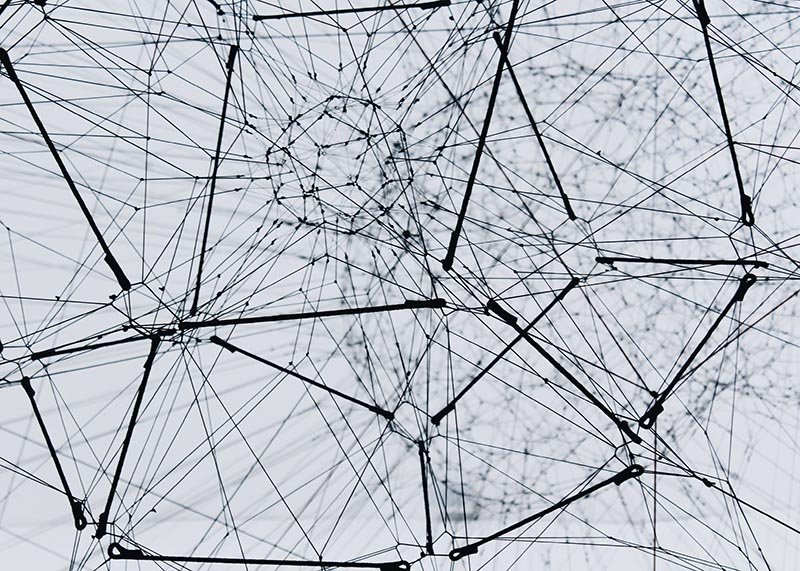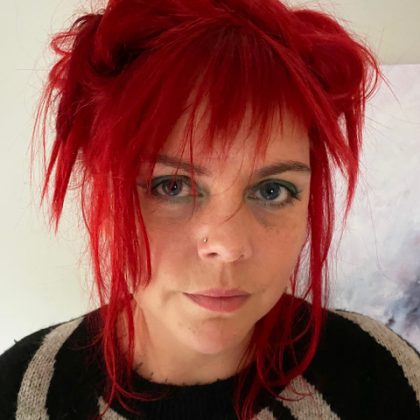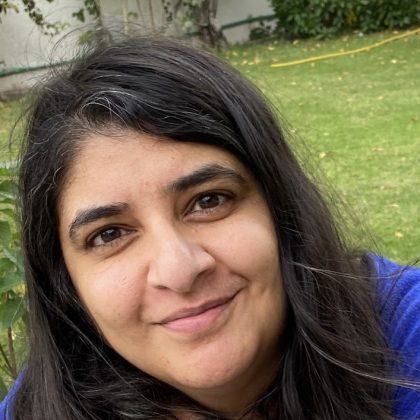Embracing intersectionality in art therapy
Opinion
We invited art therapists and activists, Corrina and Sejal to tell us about the course they are teaching for members of the British Association of Art Therapists on intersectionality and self-reflexive practice, and their drive to make art therapy more inclusive.

Intersectionality: its importance and origins
Put simply, intersectional thinking guides us to embrace understandings of a world of entanglements rather than separations. As art therapists, it can advocate systems thinking and enhance our understanding of the complexities of the human experience. It can help our understanding of ourselves, our clients, trainees and colleagues.
As a framework, intersectionality can also encourage considerations of identity and the relational nature of power, privileging the voices of marginalised communities and calling for social justice.
Intersectionality has become commonplace in vocabulary and further understood within the realms of art therapy now, which is great! However, intersectionality should not be co-opted in comfortable ways by practitioners.
The labour of the Black intersectional, feminists and scholar-activists at the origins of these ideas should always be referenced and named. The term was first used by Kimberley Crenshaw, an American civil rights advocate and law professor, in her influential paper, “Demarginalizing the Intersection of Race and Sex” (1989). Crenshaw suggested the metaphor of a crossroads to examine race and gender discrimination combined.
Making art therapy practices safer and more inclusive
We both have a passion for and desire to see change in our profession. We want to influence the changes we feel would make our profession a safer and more inclusive place for our clients and colleagues, particularly those who don’t fit the norm.
Art therapists have historically addressed issues of identity and social justice in literature and discourse. However, an intersectional lens advocates for the importance of going beyond exploring identity markers in isolation. Our experience has been that our profession, like many others – including training, literature, and discourse – still has work to do to fully consider power, privilege and social, personal and political positionings in practice.
We have both felt strongly that our profession here in the UK needs to be greater informed by understandings of trauma experiences through an intersectional lens (whether using this language or not). Teaching this course is our contribution to increasing opportunities for art therapists to engage in self-reflexive work that challenges potential problematic or blinkered practices whilst being supported to do this difficult work.
Creating change through training
There is a growing call for art tehrapy training informed by intersectional thinking and support for trainees and practitioners to reflect meaningfully on their own social, personal, and political positions. Whether consciously or not, this influences their work with clients and colleagues and a lack of this self-reflexive practice may perpetuate oppressive practice.
We strongly hope that the practices we advocate on the course can be the cornerstone of changes in the profession that will lead to greater inclusivity, and greater diversity on trainings and in positions of power in the profession.
Intersectionality and reflexive practice have the potential to make change in those that currently possess or gatekeep that power. This is where change needs to happen – not in those that are excluded or marginalised.
If those of us that may have power can be greater informed as to how we may use it to make needed change, then those who feel othered and excluded may feel safer in taking up space.
What happens in the intersectional self-reflexivity course?
The course will help delegates to greater understand anti-oppressive practice using intersectional frameworks, further understand art therapy practice in relation to diverse client groups, teams, and organisations and importantly do this through supportive engagement within ongoing art-based self-reflexive practice.
This will be a very personal journey for each delegate, but the course will promote a sense of community-based care in processes of learning and unlearning. Delegates will be guided to explore unconscious motives and biases that may prevent thinking about uncomfortable issues of identity, power, privilege, and prejudices in our work. This will be done in a supportive way where shame will be explicitly named and challenged.
We will cover session themes such as: explorations of community, family, culture, and ancestry, exploring ways of expanding our range of tolerance to feelings of discomfort while enacting self-care. We will also explore our individual ideas of activist-therapist work and exploring aesthetic subjectivity to decolonise the visual realm.
The definition of reflexivity is being willing to learn more about your fundamental self. The course will promote the challenging of our existing certainties and tolerating the anxieties that may come with that.
How do practitioners begin to use intersectionality to inform their practice?
We recommend that practitioners research the origins of intersectionality to better understand it, as well as other related concepts, such as colonisation, before using intersectionality to inform your practice. The literature on these topics is continuing to grow so there is plenty to read!
If you are a member of the British Association of Art Therapists, you can also sign up for the course in September.
About Corrina and Sejal
Corrina – I’m an artist, art psychotherapist, lecturer, writer and activist. I am a Romani woman from the Gypsy Romani Traveller (GRT) community. Prompted by personal experiences of racism, marginalisation and forced assimilation, I developed an interest in privileging marginalised voices and challenging social disparities and power through art, activism, and education. I Guest Co-Editored a special issue of the International Journal of Art Therapy on intersectionality and co-founded the intersectional feminist arts organisation, Sweet’Art and the feminist art therapy charity, Outskirts. I have worked as Equality, Diversity and Inclusion Advisor for the International Journal of Art Therapy as an extension of my therapist-activist work collaborating with the Editor in Chief and editorial board to implement systemic change and creating the journals Actions for Change initiative.
Sejal – I’m an arts psychotherapist, communication facilitator, writer and campaigner, with long-term experience working in mental health, healing arts, and community support settings. I offer individual and group therapy in mostly educational settings currently, as well as in private practice. In the last few years I have also been very involved in training and support groups for university staff and students regarding the needs of survivors of abuse.
As a neurodivergent woman of Indian origin, who has lived as an immigrant in the Middle East and the UK, I am passionate about expanding understanding of the ways in which personal and social power dynamics influence mental health and wellbeing of individuals and communities.
Articles
- International Journal of Art Therapy, Special Issue: Intersectionality in Art Therapy
- Eastwood, C. (2021). White privilege and art therapy in the UK: Are we doing the work?. International Journal of Art Therapy, 26(3), 75-83.
- Eastwood, C. (2012). Art therapy with women with borderline personality disorder: A feminist perspective. International Journal of Art Therapy, 17(3), 98-114.
- Eastwood, C. (2022). Finding reconnection: Using art-based intersectional self-reflexivity to ignite profession based community care in the arts therapies during the COVID-19 pandemic. The Arts in Psychotherapy, 80, 101931.
- Eastwood, C. (2023). More than words: community ignition and actions for change. International Journal of Art Therapy, 1-2.
Become a member
Becoming a member gives you access to the latest thinking, content and events to support you as an art therapist, trainee or someone with an interest in art therapy.

